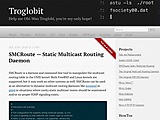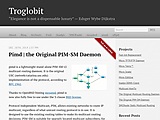 Tools for multicast testing (msend and mreceive)
Tools for multicast testing (msend and mreceive)
 mrouted is an implementation of the IPv4 multicast routing protocol DVMRP, RFC 1075. It is capable of turning a UNIX workstation, or Linux device, into a multicast router with tunneling support. Support for IGMPv1, IGMPv2, and IGMPv3. Comes with mroutectl for interacting with the daemon.
mrouted is an implementation of the IPv4 multicast routing protocol DVMRP, RFC 1075. It is capable of turning a UNIX workstation, or Linux device, into a multicast router with tunneling support. Support for IGMPv1, IGMPv2, and IGMPv3. Comes with mroutectl for interacting with the daemon.
 SMCRoute is a daemon and command line tool to manipulate the multicast routing table in the UNIX kernel. Both FreeBSD and Linux kernels are supported. SMCRoute can be used as an alternative to dynamic multicast routing daemons like mrouted or pimd in situations where (only) static multicast routes should be maintained and/or no proper IGMP/MLD signaling exists.
SMCRoute is a daemon and command line tool to manipulate the multicast routing table in the UNIX kernel. Both FreeBSD and Linux kernels are supported. SMCRoute can be used as an alternative to dynamic multicast routing daemons like mrouted or pimd in situations where (only) static multicast routes should be maintained and/or no proper IGMP/MLD signaling exists.
 "I have no idea what I'm doing ...", sound familiar? With mcjoin you can verify IPv4/IPv6 multicast connectivity without having to know what you're doing.
"I have no idea what I'm doing ...", sound familiar? With mcjoin you can verify IPv4/IPv6 multicast connectivity without having to know what you're doing.
 pimdd is a stand-alone PIM-DM multicast routing daemon available under the BSD license. This is the restored original from University of Oregon, by Kurt Windisch. pimdd is a PIM Dense Mode (PIM-DM) implementation based on pimd, which is the PIM Sparse Mode (PIM-SM) reference implementation, by Ahmed Helmy, Rusty Eddy and Pavlin Ivanov Radoslavov. PIM-DM is a significantly less complex protocol than PIM-SM. PIM-DM works on the principle that it is probable that any given multicast stream will
pimdd is a stand-alone PIM-DM multicast routing daemon available under the BSD license. This is the restored original from University of Oregon, by Kurt Windisch. pimdd is a PIM Dense Mode (PIM-DM) implementation based on pimd, which is the PIM Sparse Mode (PIM-SM) reference implementation, by Ahmed Helmy, Rusty Eddy and Pavlin Ivanov Radoslavov. PIM-DM is a significantly less complex protocol than PIM-SM. PIM-DM works on the principle that it is probable that any given multicast stream will
 mping intends to be an easy to use and script friendly program. Similar to the standard ping program, but unlike it, the response to multicast ping is sent by another mping.
mping intends to be an easy to use and script friendly program. Similar to the standard ping program, but unlike it, the response to multicast ping is sent by another mping.
 Stand alone UNIX implementation of RFC4286 Multicast Router Discovery Protocol.
Stand alone UNIX implementation of RFC4286 Multicast Router Discovery Protocol.
 pimd is a lightweight, stand-alone implementation of the Protocol Independent Multicast-Sparse Mode (PIM-SM/SSM) specification.
pimd is a lightweight, stand-alone implementation of the Protocol Independent Multicast-Sparse Mode (PIM-SM/SSM) specification.
|